Have a mistake on your Mexican birth certificate, like a misspelled name, missing surname, or wrong birthdate? You can correct it legally from the U.S. through either the Mexican Civil Registry or legal representation, often without needing to visit a consulate or travel to Mexico.
These errors can cause serious delays in getting your dual citizenship, passport, CURP, or INE. Whether it’s a misplaced accent mark or a full-blown name mismatch, we’ll walk you through the steps to fix it, including what documents you’ll need, how long it takes, and what to do if your parents are unavailable or deceased.
TL;DR: How to Fix a Mexican Birth Certificate in 4 Steps
- Step 1: Identify the Error Type: Start by figuring out what kind of mistake you're dealing with like typos, wrong names, birthplaces, or even false registrations. This will determine whether you need a simple registry correction or full judicial annulment.
- Step 2: Gather Supporting Documents: You’ll need your apostilled and translated U.S. birth certificate, your parents’ IDs or death certificates, and any additional records (e.g., marriage, school, or baptismal docs) to support your case. Scanned copies are enough to get started.
- Step 3: Choose the Right Legal Path: Minor issues may be fixed through the local Civil Registry, but more serious errors require court filings before a judge. Each Mexican state has different rules, so the approach depends on where your record is held.
- Step 4: File the Correction or Annulment: Once your legal route is set, the correction must be submitted in the municipality where the birth was originally registered. With Doble Nacionalidad, you don’t need to travel, we file everything through licensed attorneys and trusted in-person agents across Mexico.
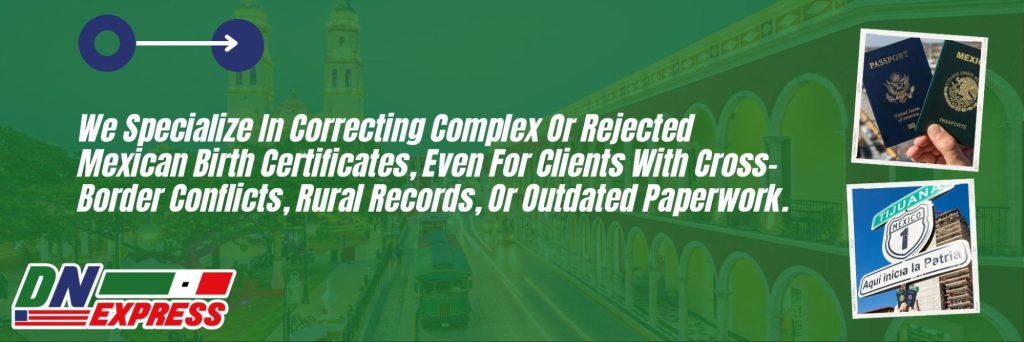
If you want the full breakdown, keep reading. Below, we’ll show you exactly how to fix a Mexican birth certificate from the U.S., with or without the consulate.
How to Correct a Mexican Birth Certificate from the U.S.
Common Errors That Cause Citizenship Delays
Even the smallest mistake on a Mexican birth certificate can block access to citizenship, passports, or legal identity documents like the CURP or INE. As legal professionals who’ve corrected thousands of these cases, we see the same errors over and over:
- Spelling mistakes: Names like “Alejndra” instead of “Alejandra,” or “Jose” missing an accent, are more than simple typos, they can trigger a denial from Mexican authorities.
- Switched or reversed surnames: In Mexico, the paternal surname comes first. If the order is reversed or one is missing, it can disqualify a dual citizenship request.
- Incorrect birthdates: Even being off by a single day or year may require judicial correction before any nationality or passport applications can move forward.
- Wrong birthplace: If you were born in the U.S. but your certificate falsely says Mexico, or even lists the wrong city, this could be considered an “apocryphal act” and may require annulment.
- Accents, hyphens, and suffixes: A missing accent mark or the inclusion of “Jr.” can create enough inconsistency to delay or block legal processes. These seemingly minor details matter when matching records between countries.
Worry: “Will this mistake affect my dual citizenship or my child’s ability to apply later?”
Yes, any mismatch in names, birthplaces, or dates across documents can lead to rejection, not just for you but for your children down the line. That’s why it’s critical to correct these errors now, before you file any applications.
Why These Mistakes Matter
It’s easy to dismiss a small spelling error or date discrepancy, until it blocks something major. In our experience helping thousands of Mexican-American families, these document mistakes create real legal roadblocks that can take months (or years) to resolve if ignored.
- Legal implications for passports, INE, and dual citizenship: Mexican authorities require exact matches across documents. If your Mexican birth certificate doesn’t align with your U.S. documents, your request for citizenship, a CURP, or an INE (Mexico’s voter ID) can be denied outright.
- Problems with U.S. Social Security or immigration filings: Some clients discover these errors only when applying for benefits or submitting identity proof for U.S. immigration cases. Inconsistent names or birthplaces can trigger delays, audits, or even suspicions of fraud.
- “Double birth certificate” issues: In some cases, individuals were incorrectly registered as born in Mexico, even though they were born in the U.S. These apocryphal records need to be annulled before you can claim nationality the legal way.
- Name conflicts between generations: If your name doesn’t match your parents’ records, or if your child’s name doesn’t align with yours, it can block them from claiming their rightful nationality later. These mismatches ripple through generations if left unfixed.
More than some paperwork issues, they’re identity problems that affect your legal rights in both countries. And the longer they go uncorrected, the more complex (and expensive) they become.
Step-by-Step: How to Fix a Mexican Birth Certificate
Step 1 – Identify the Error Type
Before you take action, you need to understand exactly what kind of error you’re dealing with. The correction process depends heavily on the nature and severity of the mistake:
- Typos or minor spelling issues: These can usually be resolved through an administrative process at the Civil Registry. That includes simple corrections like a missing accent or transposed letters in your name.
- Incorrect names, dates, or places of birth: These require a judicial correction, meaning the case must go before a judge in Mexico. This includes situations where your Mexican birth certificate lists a city you were never born in or reverses your first and middle names.
- False registrations (apocryphal records): If someone registered you in Mexico even though you were born in the U.S., your record may need to be annulled entirely. This is common in older cases where parents sought benefits, schooling, or residency in Mexico using false data.
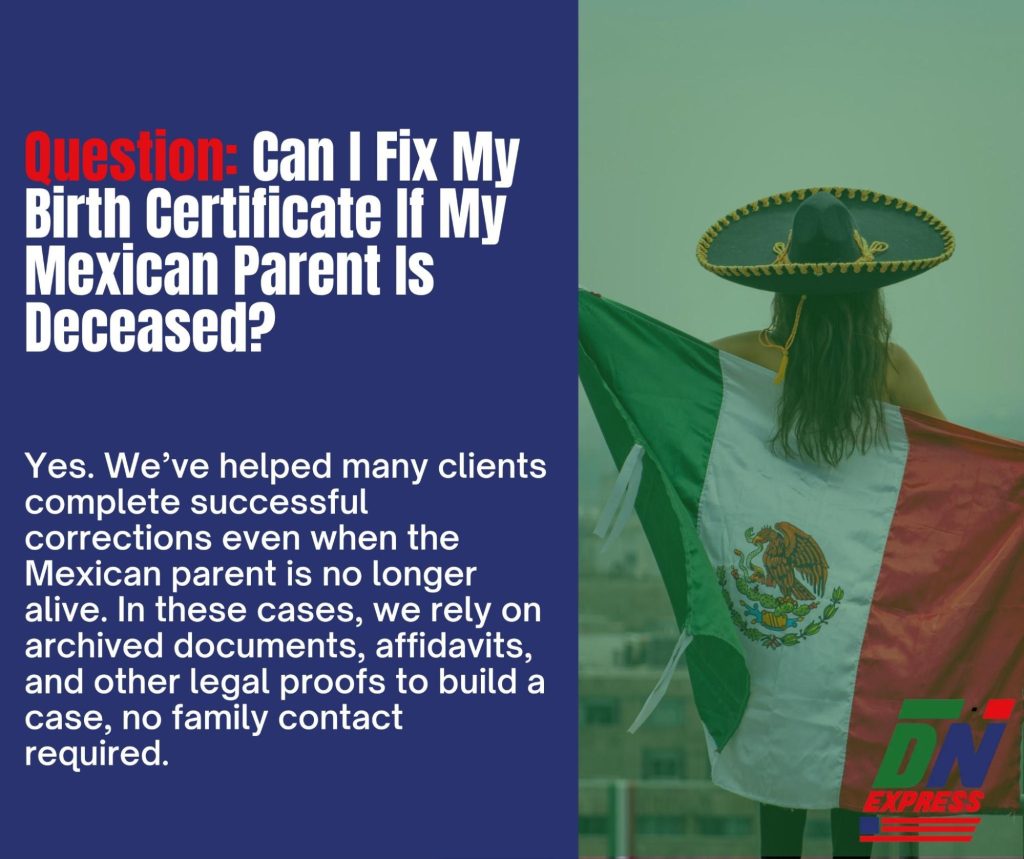
Step 2 – Gather the Right Documents
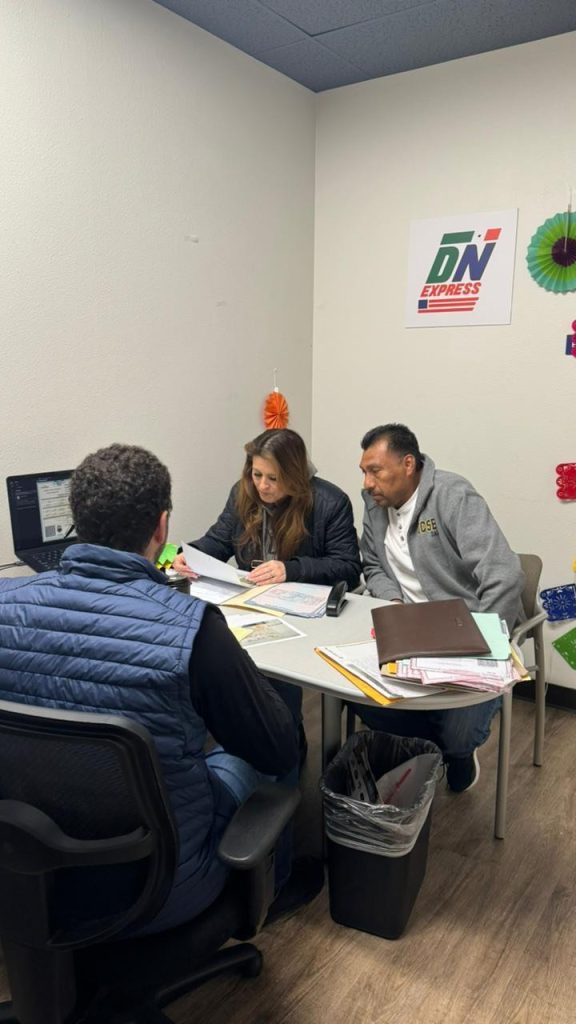
Once you’ve identified the type of error on your Mexican birth certificate, the next step is to gather the supporting documents needed to correct it. These documents serve as the legal foundation of your case and must clearly prove the correct information.
Here’s what you’ll typically need:
- Certified U.S. birth certificate: This must be apostilled in the state where it was issued and translated into Spanish by a certified translator. Both the apostille and translation are legal requirements for Mexican courts or Civil Registries to recognize the document.
- CURP (Clave Única de Registro de Población): If you already have a CURP, include it. If not, this can be created or corrected during the birth certificate process.
- Identification for both parents: This could include Mexican IDs (like INE), passports, or in the case of a deceased parent, a death certificate.
- Additional support documents: Depending on the case, you may also need:
- Baptismal certificates
- Old passports
- Actas de matrimonio
- School or medical records (especially for rural cases or generational discrepancies)
💡 Pro Tip: You can start the process with digital scans of these documents. At Doble Nacionalidad, we conduct full case evaluations based on scanned copies before requesting physical originals, saving you time and stress.
Helpful Resource → Certified Document Translation: Best prices with Dual Nationality Express
Step 3 – Choose a Legal Path Based on Your State
The correction process isn’t the same across Mexico. Each state has its own procedures, timelines, and legal thresholds. For that, choose the right path based on the location where your birth was registered, or where the record is held.
- Direct correction through the Civil Registry: If the error is minor, like a misspelled name or a missing accent, you might be able to fix it directly at the local Civil Registry. This is the fastest path, but only works in cooperative jurisdictions and for simple issues.
- Judicial petition (via a Mexican judge): For more serious errors, like a wrong birthplace, swapped surnames, or false registration, you’ll need to file a judicial petition. This involves presenting your case in court, usually with supporting evidence and sworn declarations.
- Certificate of Nonexistence (“Certificado de Inexistencia”): In some states, if you’re correcting or annulling a false registration, you must first prove that no legitimate birth record exists in the correct jurisdiction. This document must be issued by the Civil Registry and may be required in both English and Spanish.
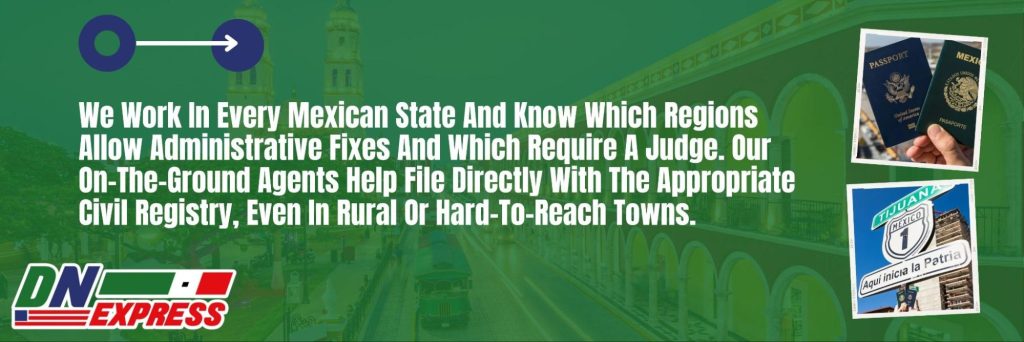
Step 4 – File the Correction or Annulment
Once your documents are in order and the legal path is clear, it’s time to file the correction, or, in more complex cases, pursue annulment of the false record.
- File in the correct municipio: All corrections must be filed in the same Civil Registry or municipal court where the birth was originally registered. This holds true even if that registry is in a small, rural town or a state with limited infrastructure. At Doble Nacionalidad, we work with local agents across all 32 Mexican states to handle this on your behalf, no travel required.
- Court notices may be required: For judicial cases, especially annulments, the court may require a public notice to be published in a local newspaper. This step gives legal transparency and allows for any potential objections.

❓ Is there a statute of limitations for fixing these errors?
No. There’s no time limit for correcting a Mexican birth certificate. Whether the error happened two years ago or 40, you still have the legal right to fix it. However, the longer you wait, the more complicated the process can become, especially if original witnesses or documents are no longer available. That’s why it’s always best to act as soon as you discover the issue.
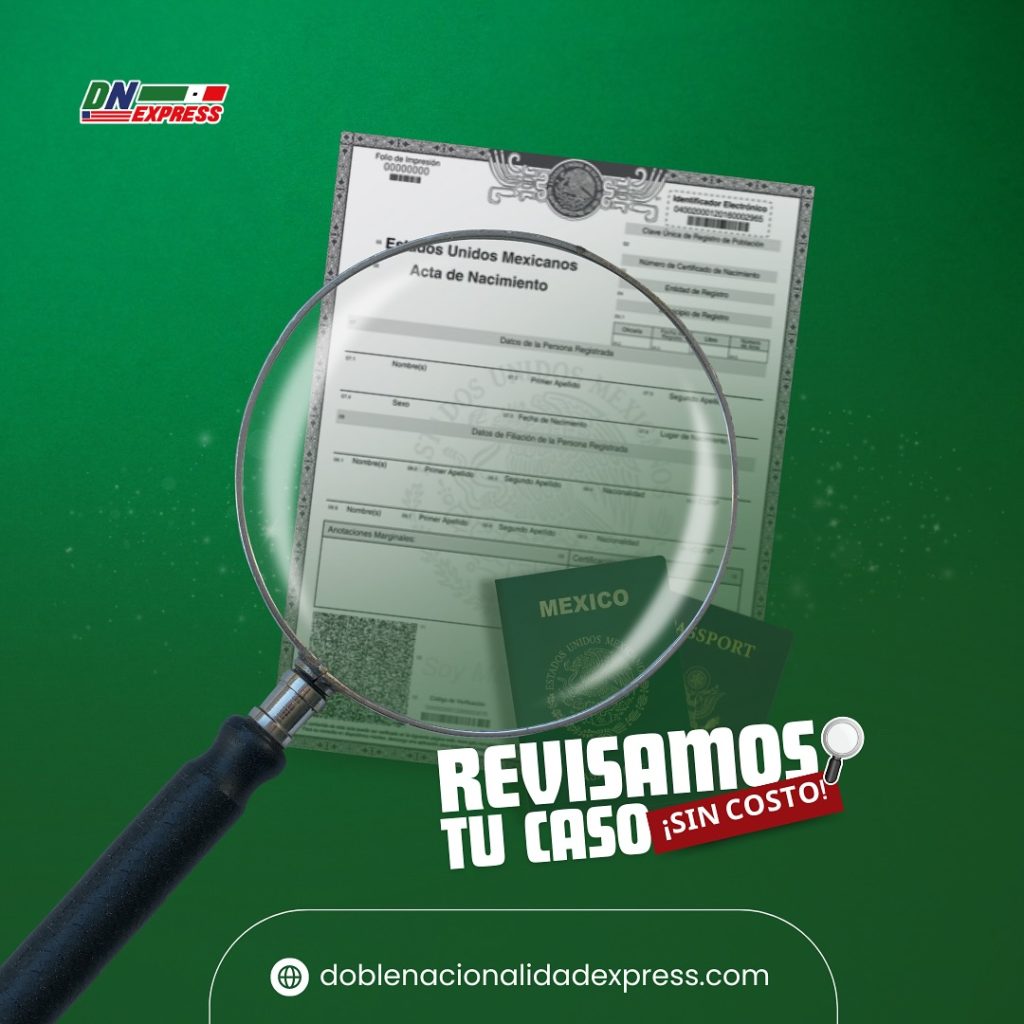
Can You Fix It Without Traveling to Mexico?
Yes, you can correct your Mexican birth certificate without setting foot in Mexico. In fact, most of our clients at Doble Nacionalidad complete the entire process remotely, from initial document review to final certificate issuance.
- Power of attorney (Poder Notarial): You’ll authorize a licensed attorney or legal representative to act on your behalf. This is standard in cross-border legal work and allows us to file, attend hearings, and submit corrections for you, even in states that require in-person appearances.
- Some states still require local signatures: In rare cases, a specific municipality might request a live signature or presence. When that happens, we send an authorized proxy to represent you or use remote authentication methods approved by the court.
Worry: “I’m scared of getting scammed. How do I find someone trustworthy?”
This is a real concern, and a valid one. Sadly, we’ve seen countless cases where people were misled by “facilitators” on social media who promised quick results but disappeared after taking money or documents. At Doble Nacionalidad, we’re not a document prep service, we’re a licensed legal team with a verified track record, in-house attorneys, and strict privacy protocols. You can verify our credentials, speak directly with our staff, and follow your case every step of the way.
Why the Consulate Often Can’t Help
If you’ve already tried contacting your local Mexican consulate, you’ve probably hit a wall. While consulates are helpful for some nationality services, they rarely handle corrections to birth certificates, especially when the error originates from Mexico’s side.
- Most consulates won’t process correction requests: Even if your error seems minor, many consulates will tell you it must be resolved in Mexico directly. They don’t have the authority to alter birth records from Civil Registries.
- Appointments are hard to get and slow-moving: In some U.S. cities, consulate appointments are booked out for months. And even when you do get one, the staff often refers you back to the registry in Mexico without a clear next step.
- They lack legal jurisdiction for complex cases: If your issue involves a wrong birthplace, apocryphal registration, or surname conflicts, you’ll need legal intervention in Mexico. The consulate is not empowered to handle those cases or make binding legal decisions.
❓ Question: “The registry never answers. What if I can’t get in touch with them?”
You're not alone. Many Mexican Civil Registries don’t respond to international calls or emails, especially in smaller municipalities. That’s why our clients turn to Doble Nacionalidad. We maintain an active network of in-person agents throughout Mexico who file, follow up, and even walk into registries for you. When the government doesn’t respond, we do
Why Work with Doble Nacionalidad (Instead of Doing It Alone)
Correcting a Mexican birth certificate can feel overwhelming, especially from abroad. Laws vary by state, courts have their own procedures, and one wrong move can lead to delays or denial. That’s where we come in.
What Doble Nacionalidad Offers That Others Don’t
- 100% remote process, no travel required: We complete the entire correction process while you remain in the U.S. or anywhere in the world. You won’t have to visit a registry, stand in line, or fly to Mexico.
- Handled by licensed Mexican attorneys: Every case is overseen by our in-house legal team. This means your documents, filings, and petitions are reviewed by professionals, not outsourced to call centers or third-party facilitators.
- We file in court when needed: Many firms stop at “paperwork help.” We go further. If your correction requires judicial intervention, we prepare and submit real court filings under your name, supported by sworn declarations and legal evidence.
- 3,000+ success stories, and counting: We’ve helped families across California, Texas, Illinois, and beyond, including those who were previously rejected by consulates or misinformed by government offices. Our clients come to us for solutions, especially when others tell them it's impossible.
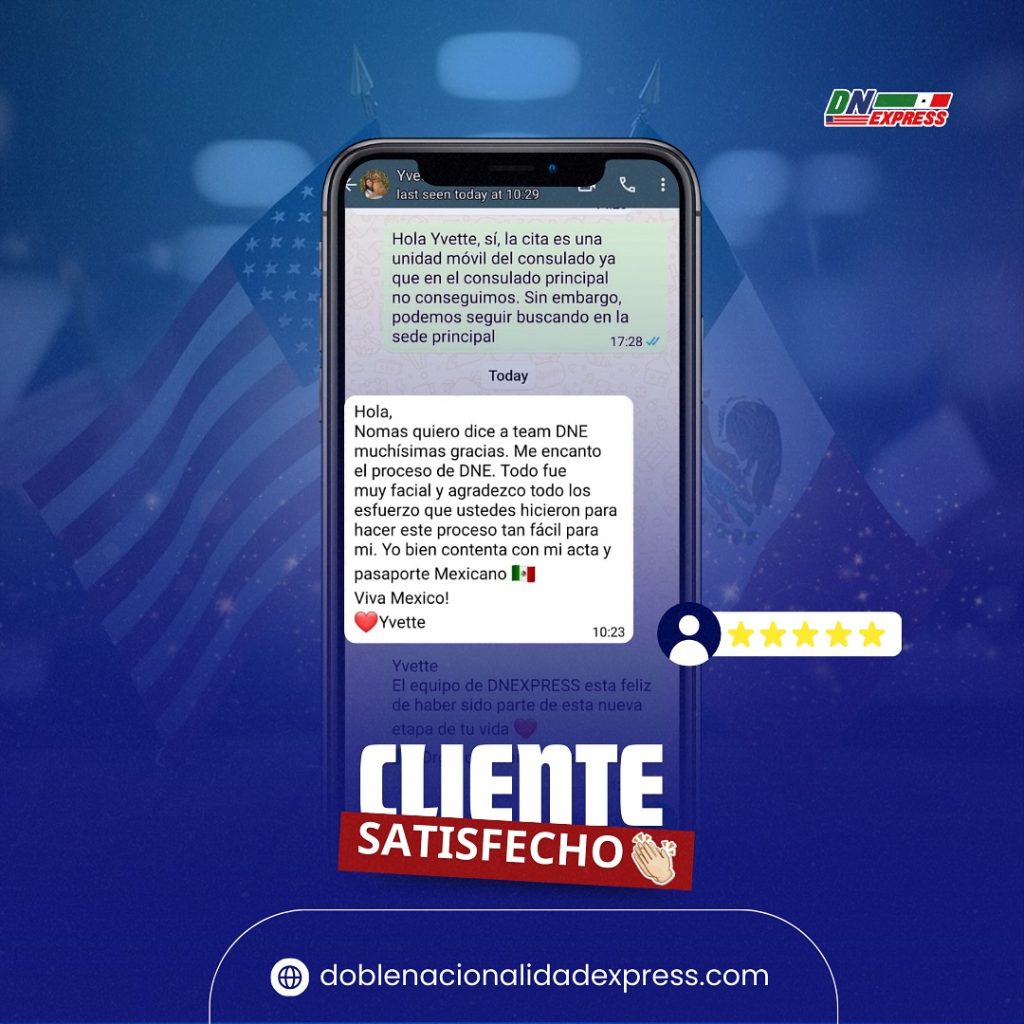
When you choose Doble Nacionalidad, you’re not only fixing a document. You’re restoring your legal identity and making sure your name, date of birth, and place of origin reflect the truth, on both sides of the border.
What Happens When You Do It Yourself
It’s tempting to try handling your birth certificate correction on your own, especially if the error seems small. But many people don’t truly realize how technical and jurisdiction-specific the process is until it’s too late.
- Incorrect filings lead to rejection: One wrong word, missing document, or incorrect jurisdiction can get your application denied. And when that happens, you often have to start from scratch, costing you time, money, and legal credibility.
- Wrong apostille or translation = instant rejection: Every U.S. document submitted in Mexico must be apostilled by the correct authority and translated into certified Spanish. If it’s not done to standard, the Civil Registry or judge will toss the entire case.
- Civil Registries often ignore international requests: Even if you send a perfectly written letter or email from abroad, many registries won’t respond. They’re simply not equipped to handle foreign communications, especially in English.
Worry: “What if I spend all this money and get denied?”
That’s the risk of doing it alone. But with Doble Nacionalidad, you’re backed by legal professionals who know exactly how to navigate these systems. We only take cases we know how to win, and we keep you updated every step of the way. No wasted filings. No guesswork. Pure results.
Real Results, Even in Tough Cases
En Doble Nacionalidad, we specialize in the cases other firms won’t touch, the ones that feel impossible, tangled, or emotionally draining. Whether your parent is unreachable, documents are missing, or your registry is in a remote village, we’ve seen it all, and we’ve solved it.
- Estranged or deceased parents? We’ve got you: Many of our clients believed their cases were dead ends because their Mexican parent had passed away or they hadn’t spoken in decades. We use archived records, secondary documents, and sworn statements to move forward without relying on family cooperation.
- Fast resolutions for straightforward cases: With clean documents and full cooperation, we’ve resolved name and birthplace corrections in as little as 8–10 weeks. Our legal team prepares everything in advance so we can act quickly once we file.
- We find records others can’t: Whether your registration is buried in a rural Jalisco registry or handwritten in a ledger in Oaxaca, we have agents across Mexico who know where and how to search. We’ve recovered lost, misfiled, and even unindexed records to help clients move forward.
The point is: We've seen the worst-case scenarios turn into success stories. Let us make yours one of them.
Start Fixing Your Birth Certificate Today
You don’t need to figure this out alone. Whether you’re correcting a small typo, resolving a decades-old surname mismatch, or annulling a false Mexican registration, Doble Nacionalidad is here to help.
We offer a fast, fully remote legal process backed by licensed Mexican attorneys, no consulate visits, no guesswork, and no wasted filings. Our mission is simple: to make identity correction and dual citizenship accessible, affordable, and real for every family who qualifies.
Call or Message Us on WhatsApp
Schedule a Free Case Review
Let us help you reclaim what’s rightfully yours, your name, your roots, your nationality.

Frequently Asked Questions
Q: How much does it cost to fix a Mexican birth certificate?
A: The cost typically ranges from $100 to $500, depending on the type of correction, whether judicial filing is required, and which Mexican state the record is held in. At Doble Nacionalidad, we offer transparent pricing, payment plans, and never charge hidden fees.
Q: Can this affect my U.S. citizenship?
A: No. Correcting your Mexican birth certificate or applying for dual nationality does not impact your U.S. citizenship. Both countries allow dual citizenship, and fixing your documents only strengthens your legal identity.
Q: Will this delay my passport or dual nationality?
A: Yes. Any unresolved errors on your Mexican birth certificate can block applications for a Mexican passport, CURP, or INE. We always recommend correcting these issues before applying to avoid rejection or long delays.
Q: Can I start even if I only have digital documents?
A: Absolutely. You can begin the process with digital scans or photos of your documents. Our team will review them first, then guide you through what’s needed next, including when and how to obtain certified originals if necessary.



